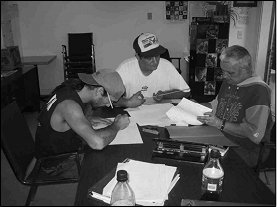

Having the group, as a whole, become responsible for the planning and decision- making promotes teamwork, allows for peer learning, provides a synergistic effect, and builds morale/spirit. Learners also have numerous opportunities to acquire and hone 'soft skills', such as speaking and listening, in a real-life group environment.
With sufficient training of the participants, the presence of a coordinator or staff member at these meetings as an occasional facilitator and support person is all that is needed
".you often hear adult educators wringing their hands and saying, "oh, how can we motivate people to learn, I can't get people to learn." And I say, nonsense, people are already learning, they're already doing it, what do you mean you can't motivate people. Maybe you can't motivate them to learn what you want them to learn, but they're motivated to learn. They're already doing it. You don't have to stimulate people to learn, and yet a lot of adult educators perceive adults as not normally learning. It's not a normal thing for them, you have to somehow motivate them or force them or persuade them to do this thing. Well, they're already doing it, they just may not be doing it the way the educator wants them to do it."
Kendra Gollihar (http://www.gollihar.com/)
"From an LBS viewpoint these meetings provided an excellent venue for participatory learning in Speaking & Listening and Self-Direction & Self-Management. The group moved itself and each participant forward in these domains with no 'teaching' and little facilitation by staff. These 'soft skills' are often more difficult to 'teach' in a formal setting."
-Trails to Literacy-Report on Pilot Project (NLS 2000)
